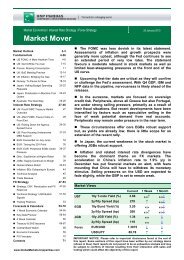Japan: Real Reason for ‘Turning Japanese’• Putting off needed structural reforms for lackof political (and popular) will to tolerate shorttermpain for the sake of long-term gain is arecipe for continued crises.• As in Europe today, after its bubble burstJapan relied for a long time on (1) forbearancepolicies to grow out of its balance-sheet woesand (2) aggressive fiscal spending to maintainthe spending structure and to shore up slumpinggrowth, but the result has been prolonged subpargrowth and biggest public debt of anydeveloped nation.• Japanese policymakers had thoughtproblems could be solved by economic growth,but trend growth cannot recover as long asbalance-sheet troubles are left unresolved. Thisrequires strict asset assessments, adequateloan-loss reserves and public fund bailouts.4.54.03.53.02.52.01.51.00.50.0Chart 1: Japan’s Per Capita Trend Growth Rate(= natural rate of interest, %)Potential grow th rate per w orker(five-year moving average)-0.585 86 87 88 89 90 91 92 93 94 95 96 97 98 99 00 01 02 03 04 05 06 07 08 09 10 11Source: Cabinet office, MIC, <strong>BNP</strong> ParibasChart 2: Eurozone’s Per Capita Trend Growth Rate(= natural rate of interest, %)3.0• It seems that the sovereign debt crisis inEurope today is being aggravated becausepolicymakers are doing the same thing Japandid earlier.2.52.01.5Potential grow th rate per labor force(five-year moving average)• While Japan was the frontrunner in problemslike balance-sheet woes, banking crises, longtermeconomic stagnation, public debt anddeflation, the eurozone has surpassed Japan insovereign debt issues destabilising the financialsystem. But if Japan continues to put off fiscalreforms, it could end up like the ailing nations ofsouthern Europe today, but without a Germanyto bail it out.1.00.50.0-0.598 99 00 01 02 03 04 05 06 07 08 09 10 11Source: Eurostat, <strong>BNP</strong> ParibasThere are numerous reasons why the sovereign debtwoes in the eurozone have been aggravated. Onereason is the adoption of forbearance policies, whichJapan also did after the bursting of its real estatebubble of the 1980s. Rather than quickly moving toresolve the balance-sheet troubles afflictingEuropean banks, something that requires stricterasset assessments, adequate loan-loss reserves,and then plugging any capital shortfalls with publicmoney (if funds cannot be procured from the market),policymakers in the eurozone have opted forforbearance policies in the hope that revivedeconomic activity will enable their economies to growout of these problems. Unfortunately, as Japandiscovered, the failure to resolve balance-sheettroubles actually weighs on economic activity. Thetrend growth rate (i.e., potential growth rate) declinesbecause both real and human capital accumulation,is thwarted by impaired financial intermediation andfalling growth expectations.But as in Japan in the 1990s, various pressures workagainst the imposition of strict asset assessments.For one thing, banks themselves are wary becauseof the inevitable damage to earnings. Second,instead of cracking down on banks to ensure thatassets are stringently evaluated, authorities tend toallow lax assessments out of concern that banksmight cut back on credit to the detriment of themacroeconomy. Third, since strict assetassessments usually necessitate the injection oftaxpayer money to shore up undercapitalised banks,the authorities prefer to avoid doing this becausesuch bailouts are not only unpopular but they alsoRyutaro Kono 20 October 2011<strong>Market</strong> Mover16www.Global<strong>Market</strong>s.bnpparibas.com
exacerbate fiscal deficits. Thus, as long as theauthorities can act at their own discretion, they tendto gravitate toward forbearance policy.Forbearance policy and fiscal stimulus: twosides of same coinAnother reason for Europe’s worsening sovereigndebt woes is the aggressive fiscal stimulus to propup growth rates, which is really just the flip side offorbearance policy. First, budget deficits are run upto maintain spending structures that areunsustainable because they are predicated on taxrevenue levels of the bubble’s heyday (this isparticularly true in Greece, Portugal and Italy). Then,to shore up floundering growth when a boom ends,policymakers irrationally undertake additional fiscalspending. The result is the massive fiscal deficits thatcurrently afflict some eurozone states.0-2-4-6-8-10-12Chart 3: Fiscal Conditions in Eurozone(2011 forecasts)Public debt (% of GDP)0 20 40 60 80 100 120 140 160 180 200 220Budget deficit (% of GDP)SpainGermanyFranceUKUSEuro areaPortugalIrelandItalySource: European Commission, OECD, <strong>BNP</strong> ParibasGreeceChart 4: Current Account in OECD Nations(% of GDP, 2010)JapanEconomic growth during a bubble is inherentlyunsustainableEconomic expansion during a bubble is inherentlyunsustainable, so some degree of reduced growthmust be tolerated while the bubble’s excesses areundone. Although Japan’s lesson of the 1990sshows that, no matter how aggressivemonetary/fiscal policy might be, trend growth will notrevive as long as balance-sheets are not cleaned up.The authorities in many European nations still spentmassive amounts of tax money to prop up growthafter the “once-in-a-century crisis.”20151050-5-10-15NorwayLuxembourgSwitzerlandGermanyIcelandSwedenNetherlandsDenmarkJapanFinlandSource: OECD, <strong>BNP</strong> ParibasAustriaKoreaIrelandHungaryBelgiumMexicoUnited KingdomCzech RepublicSlovak RepublicFranceCanadaPolandItalyUnited StatesAustraliaTurkeyNew ZealandSpainPortugalGreeceSovereign debt woes trigger financial systemturmoilProblems in the eurozone are, as we have pointedout, basically the same as those experienced byJapan in the 1990s, and by the US today. Followingthe collapse of its credit bubble, America also optedfor a forbearance approach to its balance-sheettroubles, but the discretionary macro stabilisationfailed to prop up US growth and only saddled thenation with a higher level of public debt. Theeurozone, however, is facing an even moretroublesome issue: problems in the financial systemare aggravating the sovereign debt woes, which, inturn, are giving rise to further financial system turmoil.In Greece, for example, it is blatantly clear that futuretaxes cannot pay down the nation’s overwhelmingpublic debt. Consequently, prices on Greekgovernment bonds have collapsed, making itessentially impossible to finance budget deficits. Thegovernments of Ireland and Portugal also are havingdifficulty in resolving fiscal problems on their own,though the conditions are not as severe as in Greece.As for Spain and Italy, default is very unlikely but thefinancial markets are still concerned because the risksurrounding the repayment of their public debt is notas low as it used to be.Abnormal condition of being unable to raisecapital to bail out ailing banksThe upshot of all this is that cleaning up the bankingsector in the southern eurozone states, with strictasset assessments and the injection of public moneyto shore up undercapitalised banks, is made difficultby the crisis of confidence in the debt that thesegovernments issue. Consequently, what actuallyneeds shoring up is the government debt itself, whichnormally ought to be the safest domestic asset. Andbecause the leading banks in Europe are so heavilyexposed to this problem sovereign debt, theirsoundness is also being questioned. As pointed outin the Weekly Economic Report of 9 August 2011(What might happen if Japan defaults? Financialinnovations stemming from the Glorious Revolution),the smooth undertaking of financial transactions, thelifeblood of an economy, is impaired when thefinancial system is shaken by a plunge in value ofgovernment bonds, the foundation of a country’scredibility. Thus, despite being developed economies,the states of southern Europe are in the abnormalsituation of being unable to raise capital to bail outtheir ailing banks.Ryutaro Kono 20 October 2011<strong>Market</strong> Mover17www.Global<strong>Market</strong>s.bnpparibas.com
















